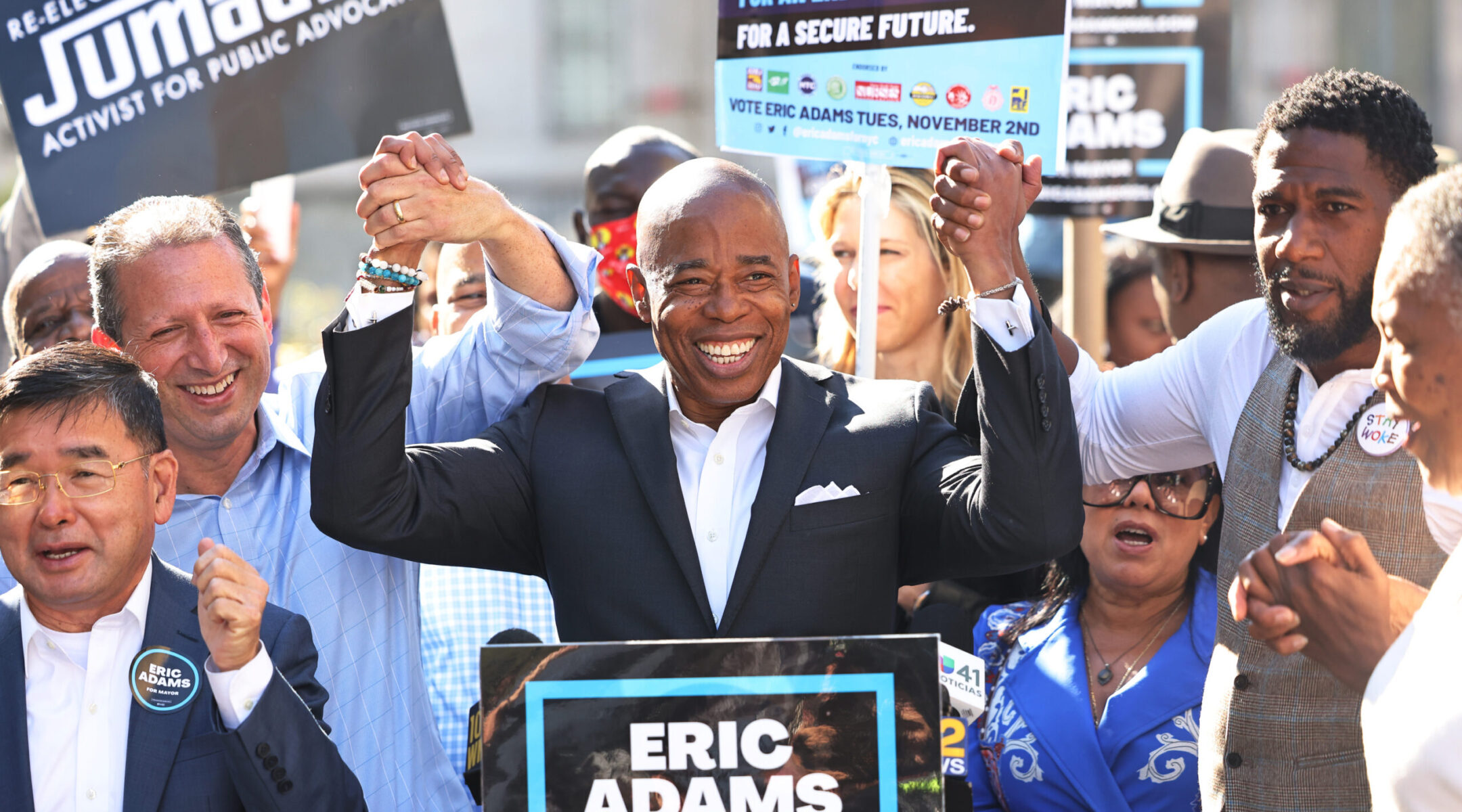Will Eric Adams resign as New York City’s mayor? The question is captivating New Yorkers as the details of his federal indictment spill out.
Facing bribery and fraud charges, Adams has sworn not to step down, and no one in the city — including its voters — can push him out before the next scheduled election, in 2025. Only Gov. Kathy Hochul has the power to remove the city’s mayor, and it’s unclear whether she would consider that step.
What is clear, however, is that a growing number of New York politicians are queuing up for a chance to succeed Adams. Some have already declared their candidacy for next year’s election, while others are jumping in amid the chaos or signaling their interest.
Among the hopefuls are two Jewish politicians who have served as the city’s top financial officer and multiple officials who have been vocal pro-Palestinian advocates. Andrew Cuomo, who resigned as New York governor after being accused of sexual misconduct, is also reportedly eyeing a run. All of them would be unlikely to advance the same staunchly pro-Israel, pro-police message that Adams, a former police captain, has conveyed.
Here’s what you need to know about the men — and one woman — who are lining up to take Adams’ spot.
Andrew Cuomo
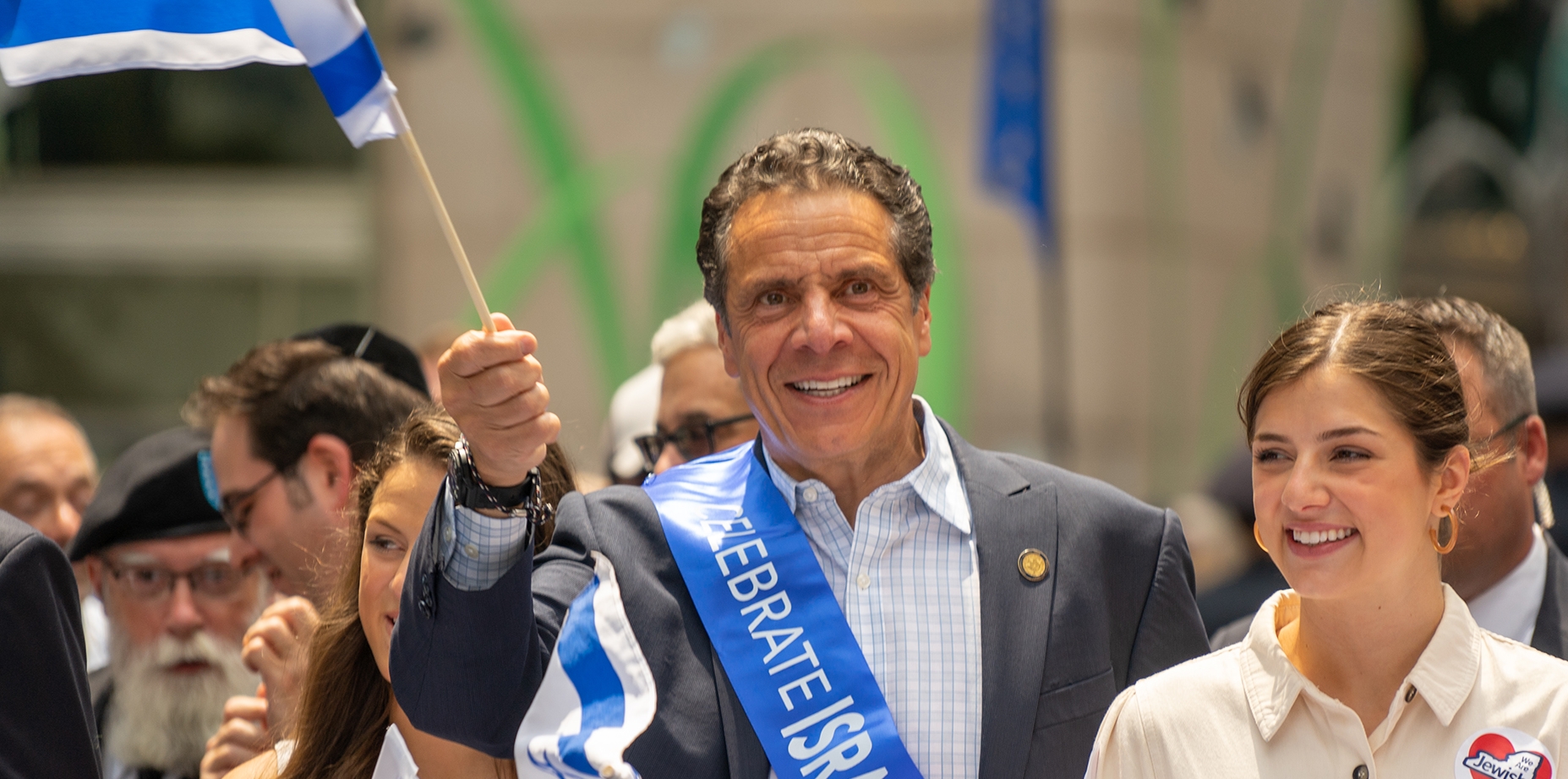
Former New York Gov. Andrew Cuomo marches in New York City’s Celebrate Israel Parade moments after he condemned the rise of antisemitism across the United States on June 2, 2019. (David Dee Delgado/Getty Images)
Cuomo’s resignation as governor amid scandal came less than a year after he drew praise for how he confronted COVID’s devastating impact on New York. Now, Cuomo is eyeing a return to public office as mayor, and he may try to tap into the Jewish constituencies that supported him during his decade in Albany — from pro-Israel activists to the city’s haredi Orthodox communities.
Cuomo, 66, cultivated haredi votes during his three runs for governor. But his relationship with haredi voters soured in 2020 when he sought to enforce COVID-era public health restrictions in their neighborhoods and — critics said — singled out haredi New Yorkers. That October, the haredi umbrella body Agudath Israel of America sued him for discrimination.
The next year, the New York Times reported that he had showed disdain for Jewish practices: While at an event celebrating the fall festival of Sukkot, he allegedly remarked, “These people and their f—ing tree houses.” His spokesperson denied the allegation and said, “He has the highest respect for Jewish traditions.”
As governor, Cuomo was a vocal supporter of Israel, signing an executive order banning the state from investing in companies that promote boycotts of Israel. In 2014, he visited Israel during a previous war with Hamas in Gaza. In 2018, he was the grand marshal of the city’s Celebrate Israel Parade.
During his 2018 primary race against actor and activist Cynthia Nixon, a mailer sent out on his behalf claimed that Nixon, who has Jewish children, “won’t stand strong for our Jewish communities.” Cuomo denied prior knowledge of the mailer.
After he resigned, pro-Israel activism was part of his incipient comeback bid. Last year, he announced the launch of a group called “Progressives For Israel.” He later renamed it “Never Again, Now!” and in July mounted an ad campaign criticizing pro-Palestinian demonstrations.
Brad Lander
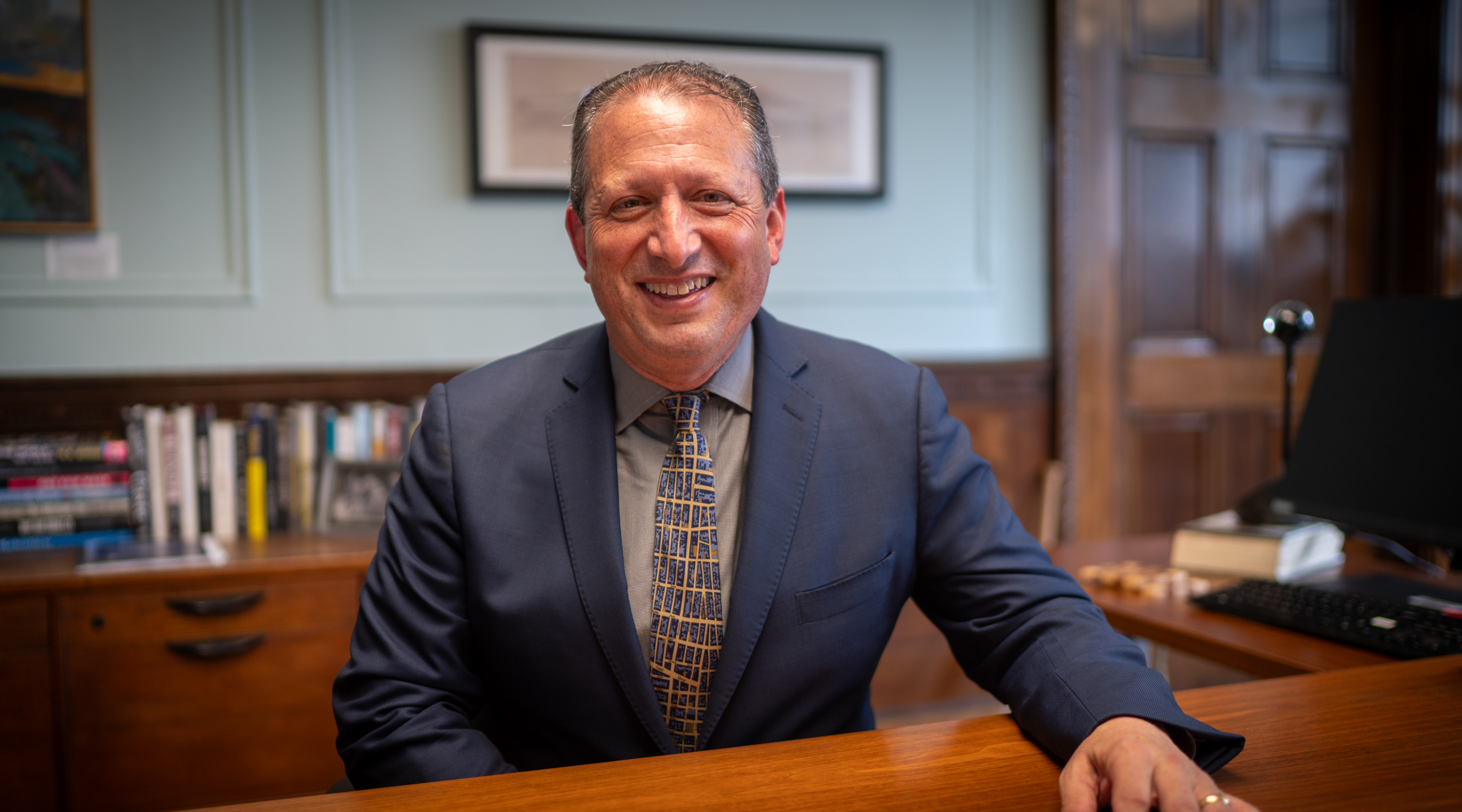
New York City Comptroller Brad Lander in his Manhattan office, July 18, 2024. (Luke Tress)
Lander, the city’s comptroller responsible for fiscal oversight, announced his mayoral run in July. He is the city’s highest-ranking Jewish official — and among the most progressive. He is also second in line of succession for mayor, after the public advocate.
A veteran of progressive nonprofits and former City Council member representing the liberal Brooklyn bastion of Park Slope as well as a corner of the haredi neighborhood of Borough Park, Lander is a member of Kolot Chayeinu, a congregation that makes a point of welcoming a diversity of views on Israel. He is also a regular attendee at Israeli-led rallies calling for a ceasefire in the Israel-Hamas war.
“That has been a place where I feel both proud to go and have my neshama nourished,” Lander told the New York Jewish Week in August, using the Hebrew word for soul. “People are going to criticize whatever you do. All I can say for sure is, I come by my point of view here honestly. This is who I am Jewishly and politically.”
Jews in left-leaning spaces say that Lander is an authentic representative of their values. Phylisa Wisdom, the director of New York Jewish Agenda, a progressive group that Lander co-founded, said, “His progressivism and commitment to social justice feels to him deeply connected to and stem from his Judaism.”
Lander, 55, grew up in a Reform Jewish community outside of St. Louis, Missouri, and worked at a Reform movement summer camp. He counts campaigning to liberate Soviet Jews and Rabbi Abraham Joshua Heschel, the mid-century Jewish scholar and civil rights activist, as two political inspirations.
Lander first called for a humanitarian ceasefire in the Israel-Hamas war in November, shortly before there was a weeklong truce. He kept up the ceasefire calls after that, when such positions were still uncommon among even progressive Jewish officials.
“I was before and am now a liberal Zionist who fiercely opposes the occupation,” he said in August.
But he has drawn criticism from some in the Jewish community for maintaining alliances with politicians and activists who oppose Israel. “There are evil antisemites in politics and he has never failed to associate himself with them,” said Brooklyn Council member Kalman Yeger.
Zellnor Myrie
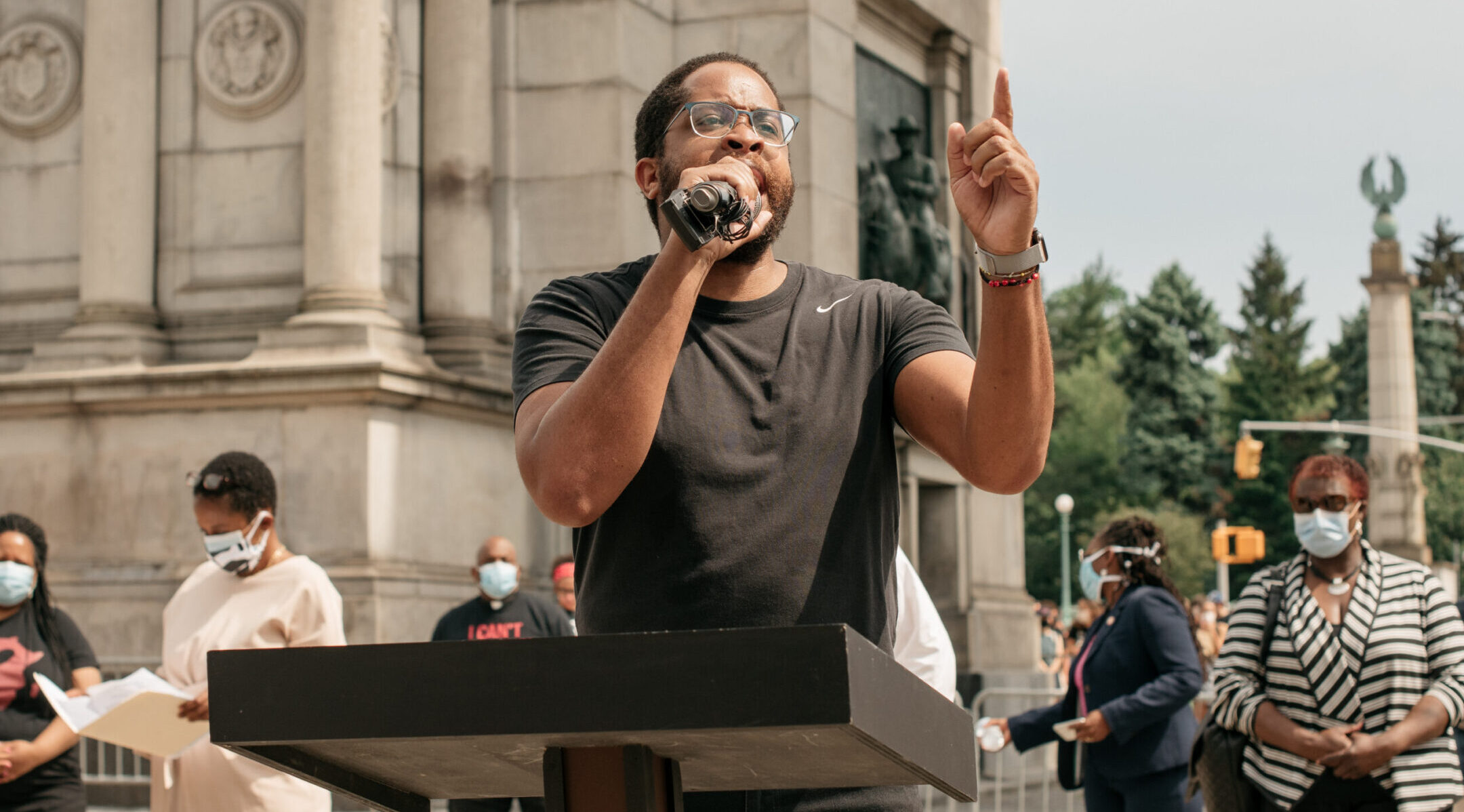
New York State Sen. Zellnor Myrie speaks at a press conference calling for legislation to increase police accountability on June 4, 2020, in Brooklyn. (Scott Heins/Getty Images)
Myrie, 37, is a state senator from Brooklyn who has a lower profile than many of the other candidates: A recent poll found that the vast majority of New Yorkers had never heard of him or didn’t know enough to form an opinion. Elected in 2018 as part of a wave of progressives who ended Republican control in Albany, Myrie has made a mark by authoring legislation about criminal justice, election reform and gun control.
Myrie encountered initial skepticism among Jews in his district over his attitudes about Israel, which were largely unformed when he entered politics. But he has won over a key constituency, the Chabad-Lubavitch community in his native Crown Heights, in part by sponsoring legislation in Albany to honor the movement’s last leader, Rabbi Menachem Mendel Schneerson. Like Scott Stringer, he is seen as potentially appealing to Jewish voters who might view Lander as too extreme on Israel.
Myrie issued a statement on Oct. 7 condemning Hamas’ attack on Israel, in which he said, “Israel has the right to defend itself, and I pray it does so in a way that increases the chances of an eventual lasting peace.” He was also among the Brooklyn politicians to decry pro-Palestinian vandalism targeting the Brooklyn Museum’s leadership in June, tweeting, “I’ll always defend the right to peaceful protest, but what we saw last Friday at @brooklynmuseum wasn’t it. Destroying property and harassing visibly-Jewish passersby doesn’t advance any cause, and only increases tension at an already anxious moment.”
Jessica Ramos
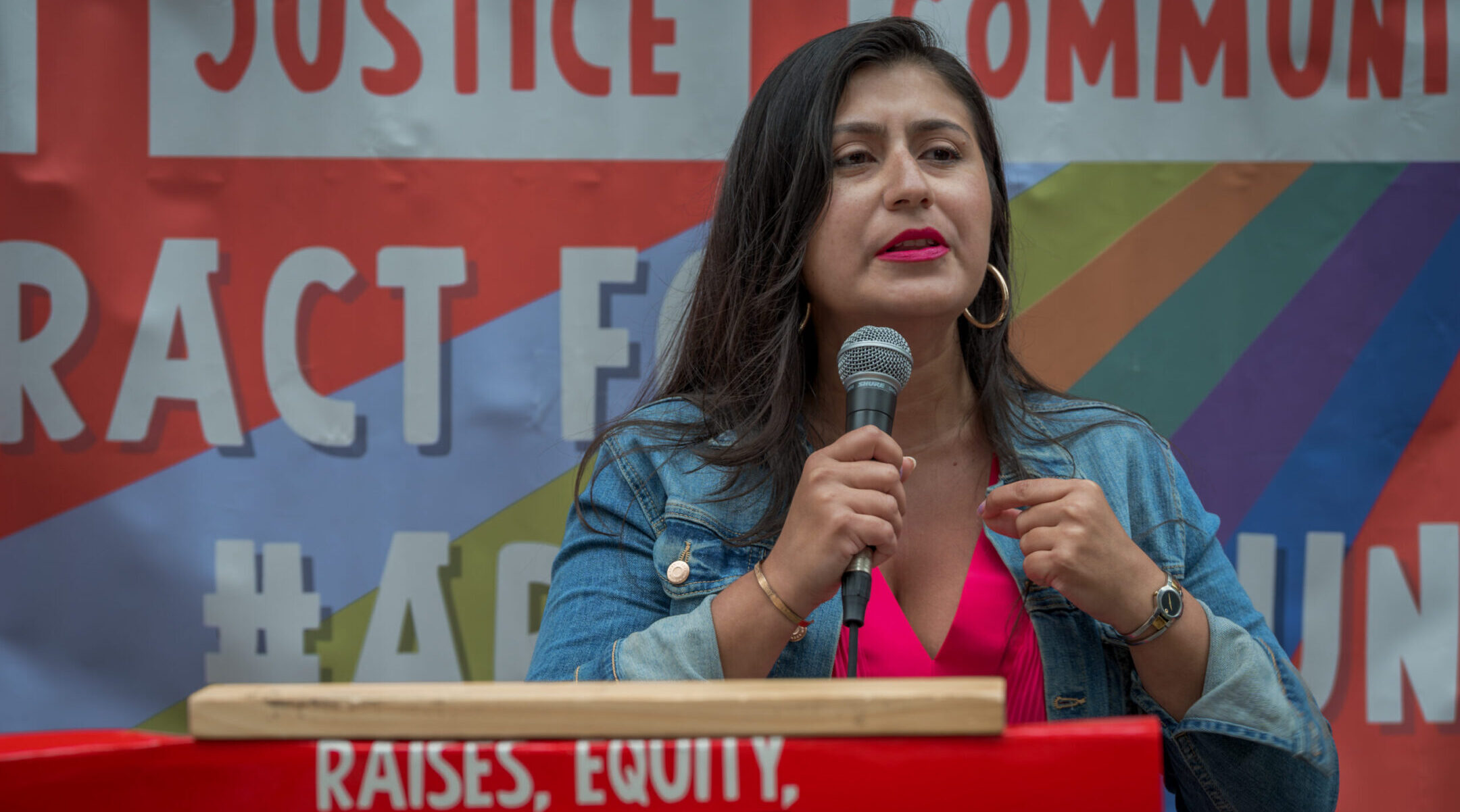
New York State Sen. Jessica Ramos participates in a rally supporting the CUNY Professional Staff Congress labor union, May 2, 2024, in New York City. Erik McGregor/LightRocket via Getty Images)
Ramos, a state senator from Queens, announced earlier this month that she was running for mayor. One of a number of progressives elected to the Assembly in 2018, she says her campaign will focus on making the city more affordable and hospitable to immigrants. She would be the first woman and first Latina to helm the city if elected.
Ramos, 39, regularly posts holiday and Holocaust commemoration messages for Jewish New Yorkers on social media, and she has also met with Jewish constituents including students from Hebrew Academy of Nassau County, a large Orthodox school. Her own district — which covers Corona, Elmhurst, East Elmhurst and Jackson Heights — does not have a large Jewish population.
Ramos is a longtime pro-Palestinian advocate. A decade ago, during a conflict between Israel and Hamas, she ignited an early firestorm in Democratic politics when she tweeted, using a notation meant to simulate a heart, “Palestine <3.” This March, she became the 13th state senator to call for a permanent ceasefire in the current Israel-Hamas war, saying in a statement, “As a New York State Senator, I stand for de-escalation, diplomacy and human rights for all people — Palestinian and Israeli.” She also said at the time that she saw Israel’s actions in the West Bank as akin to repression in her parents’ native Colombia.
Scott Stringer
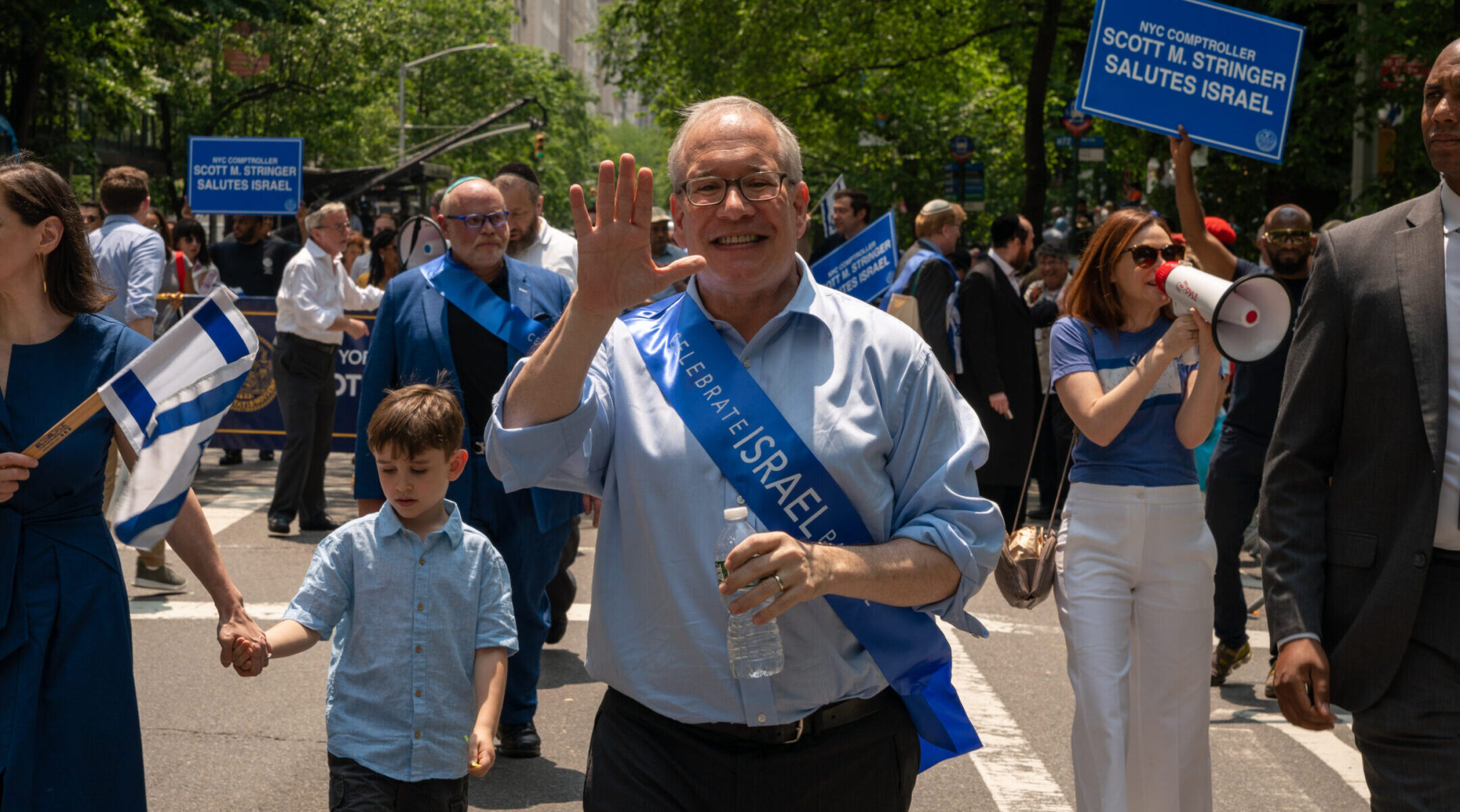
Scott Stringer, then New York City comptroller, marches in the Celebrate Israel Parade on June 2, 2019. (David Dee Delgado/Getty Images)
Scott Stringer has served as the city comptroller, Manhattan borough president and state assembly member. He also ran for mayor in 2021 as the only Jewish candidate in the race.
A progressive Democrat, Stringer’s campaign was derailed by sexual harassment allegations that he denied. He sued the accuser for defamation, but the lawsuit was dismissed because he filed it after the statute of limitation for the case.
Stringer, 64, is a former aide to Rep. Jerry Nadler, the Jewish Democrat who has represented the Upper West Side (and now Upper East Side) for decades, and cited him as one of the people he turned to for advice on Jewish issues in his 2021 bid.
Stringer has also attended Congregation Rodeph Sholom, the Upper West Side Reform synagogue, along with his wife Elyse Buxbaum, the COO of the Museum of Jewish Heritage. Their two sons attend New York City public schools.
Stringer has not held public office since finishing his second term as comptroller in 2021 and has made only limited public comments this year about the Israel-Hamas war. On Oct. 8, the day after Hamas attacked Israel to start the war, he posted on social about a pro-Palestinian demonstration that included celebration of Hamas, “This rally is total bullshit!” He is seen as likely to appeal to Jewish voters who see Lander as too far to the left on Israel.
Jumaane Williams
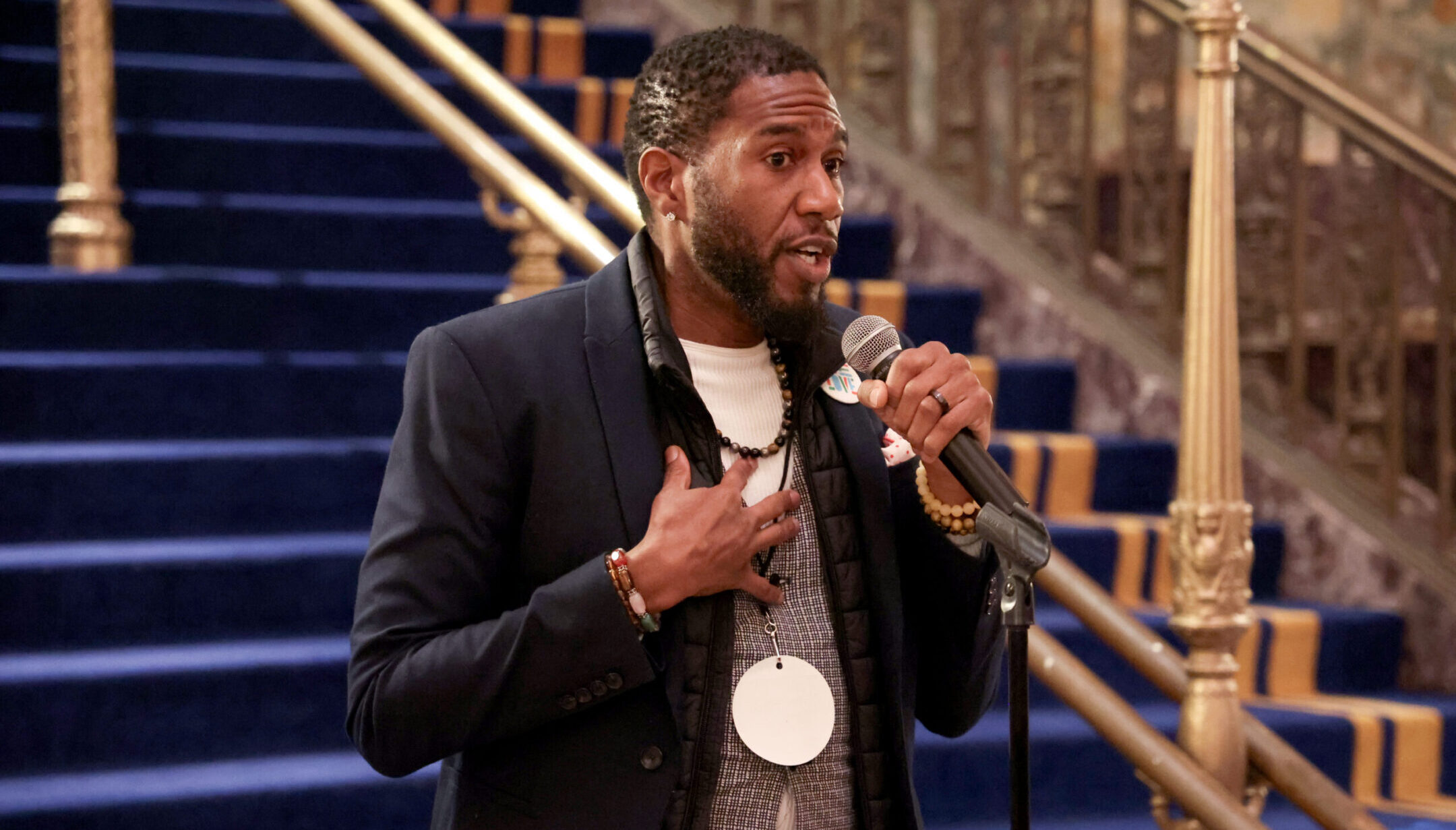
Jumaane Williams participates in the grand opening of Brooklyn Paramount on March 27, 2024, in New York City. (Kevin Mazur/Getty Images for Brooklyn Paramount)
If Adams resigns (or is removed), Williams, currently the city’s public advocate, would automatically take charge for 90 days. He has not yet said whether he would also seek to run for a full term.
A Democrat affiliated with the Working Families Party and a former City Council member, Williams is a progressive who has long been a sharp critic of Israel. This year, as Adams vowed to crack down on pro-Palestinian protests that disrupted city life, Williams criticized the mayor as not caring about Palestinian lives and implied that wealthy donors had swayed his outlook.
As a longtime local politician, Williams, 48, has also built ties with Jewish communities in the city. He has consistently criticized antisemitism, including during a string of violent crimes against Jews in early 2020 and in early 2023 when right-wing extremists were rumored to be planning a “day of hate” in New York and beyond. (He has said that he does not believe that increasing police presence is a good strategy for making Jews or other New Yorkers safer.)
This year, he denounced antisemitism in protests against the Brooklyn Museum and the Nova memorial exhibit in Lower Manhattan — and also said Adams should show the same concern for Palestinian and Muslim New Yorkers.
“In the last couple of days I’ve been proud to see our leaders quickly call out the antisemitic words and actions associated with the Brooklyn Museum and especially the exhibit on the horror at the Oct 7th NOVA music festival. I join the clear and concise message that antisemitism simply cannot be accepted. Our Jewish NYers need to hear from us,” he tweeted. “I hope that @NYCMayor at some point, lifts up the pain that Palestinian and Muslim NYers are in and have yet to hear one word from him about. Our leaders need to help unify us. Complacency and silence only deepens the pain and harm.”
The New York Jewish Week brings you the stories behind the headlines, keeping you connected to Jewish life in New York. Help sustain the reporting you trust by donating today.
